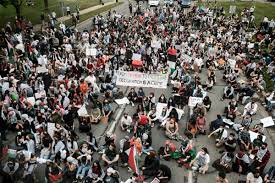According to Dima Khalidi, founder and director of Palestine Legal, “This effort to specifically redefine anti-Semitism to include any criticism of Israel has gained ground in the last several years, to the extent that this definition has been codified in-laws around the world, particularly in the United States and Europe.”
Even high-profile figures like Emma Watson and Mark Ruffalo have faced severe backlash for speaking up for the rights of Palestinians, mostly college and academic students are facing the counter back of campuses across the United States and Europe.
According to Barry Trachtenberg, a historian and professor of Jewish history at Wake Forest University, this backlash forces several students and professors to really self-censor in profound ways.
Khalidi stated that this is all about the people’s image and reputation, and about their jobs and about the way how we v=can operate and manage, and the way we talk and behave in society….And most probably, it is just the tip of the iceberg, right?
When we look at how Israel and Israel advocacy groups in the United States have attacked Palestine advocacy through harassment campaigns, we see a pattern.
Trachtenberg stated that there has been just a shift in the questioning the official narrative on Israeli administration practices, especially within a Jewish community in the US, because the gap between the promise and reality was great, and the younger generation is paying more attention to the question that has been asking about the racism in America systematic oppression of people of color, of engaging in issues of queer rights, people recognize that there can’t be this exception for Israel.”
On UpFront, Marc Lamont Hill talks with Dima Khalidi, founder and director of Palestine Legal, and Barry Trachtenberg, professor and chair of Jewish History at Wake Forest University, about the cost of speaking out for Palestinian rights.

